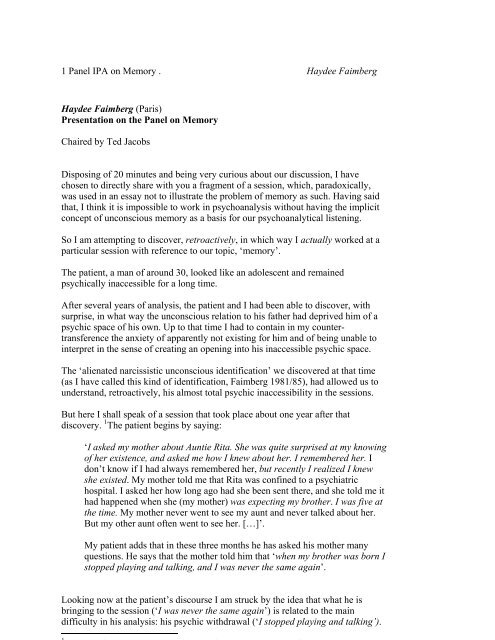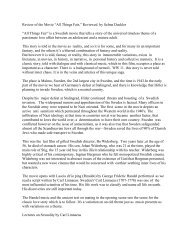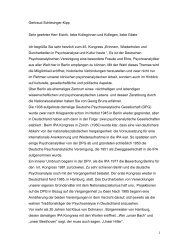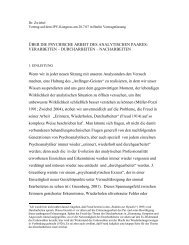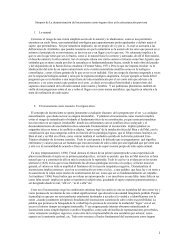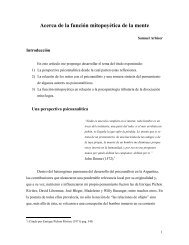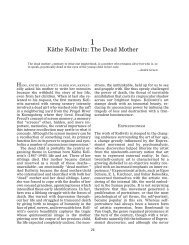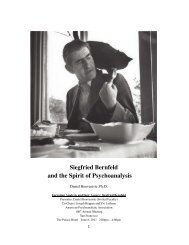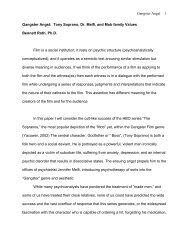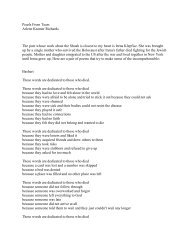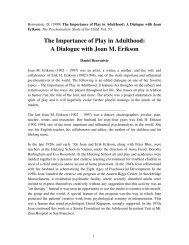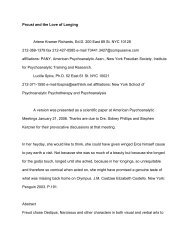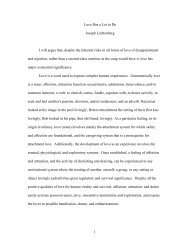1 Panel IPA on Memory . Haydee Faimberg Haydee Faimberg (Paris ...
1 Panel IPA on Memory . Haydee Faimberg Haydee Faimberg (Paris ...
1 Panel IPA on Memory . Haydee Faimberg Haydee Faimberg (Paris ...
Create successful ePaper yourself
Turn your PDF publications into a flip-book with our unique Google optimized e-Paper software.
1 <str<strong>on</strong>g>Panel</str<strong>on</strong>g> <str<strong>on</strong>g>IPA</str<strong>on</strong>g> <strong>on</strong> <strong>Memory</strong> . <strong>Haydee</strong> <strong>Faimberg</strong><br />
<strong>Haydee</strong> <strong>Faimberg</strong> (<strong>Paris</strong>)<br />
Presentati<strong>on</strong> <strong>on</strong> the <str<strong>on</strong>g>Panel</str<strong>on</strong>g> <strong>on</strong> <strong>Memory</strong><br />
Chaired by Ted Jacobs<br />
Disposing of 20 minutes and being very curious about our discussi<strong>on</strong>, I have<br />
chosen to directly share with you a fragment of a sessi<strong>on</strong>, which, paradoxically,<br />
was used in an essay not to illustrate the problem of memory as such. Having said<br />
that, I think it is impossible to work in psychoanalysis without having the implicit<br />
c<strong>on</strong>cept of unc<strong>on</strong>scious memory as a basis for our psychoanalytical listening.<br />
So I am attempting to discover, retroactively, in which way I actually worked at a<br />
particular sessi<strong>on</strong> with reference to our topic, ‘memory’.<br />
The patient, a man of around 30, looked like an adolescent and remained<br />
psychically inaccessible for a l<strong>on</strong>g time.<br />
After several years of analysis, the patient and I had been able to discover, with<br />
surprise, in what way the unc<strong>on</strong>scious relati<strong>on</strong> to his father had deprived him of a<br />
psychic space of his own. Up to that time I had to c<strong>on</strong>tain in my countertransference<br />
the anxiety of apparently not existing for him and of being unable to<br />
interpret in the sense of creating an opening into his inaccessible psychic space.<br />
The ‘alienated narcissistic unc<strong>on</strong>scious identificati<strong>on</strong>’ we discovered at that time<br />
(as I have called this kind of identificati<strong>on</strong>, <strong>Faimberg</strong> 1981/85), had allowed us to<br />
understand, retroactively, his almost total psychic inaccessibility in the sessi<strong>on</strong>s.<br />
But here I shall speak of a sessi<strong>on</strong> that took place about <strong>on</strong>e year after that<br />
discovery. 1 The patient begins by saying:<br />
‘I asked my mother about Auntie Rita. She was quite surprised at my knowing<br />
of her existence, and asked me how I knew about her. I remembered her. I<br />
d<strong>on</strong>’t know if I had always remembered her, but recently I realized I knew<br />
she existed. My mother told me that Rita was c<strong>on</strong>fined to a psychiatric<br />
hospital. I asked her how l<strong>on</strong>g ago had she been sent there, and she told me it<br />
had happened when she (my mother) was expecting my brother. I was five at<br />
the time. My mother never went to see my aunt and never talked about her.<br />
But my other aunt often went to see her. […]’.<br />
My patient adds that in these three m<strong>on</strong>ths he has asked his mother many<br />
questi<strong>on</strong>s. He says that the mother told him that ‘when my brother was born I<br />
stopped playing and talking, and I was never the same again’.<br />
Looking now at the patient’s discourse I am struck by the idea that what he is<br />
bringing to the sessi<strong>on</strong> (‘I was never the same again’) is related to the main<br />
difficulty in his analysis: his psychic withdrawal (‘I stopped playing and talking’).
2 <str<strong>on</strong>g>Panel</str<strong>on</strong>g> <str<strong>on</strong>g>IPA</str<strong>on</strong>g> <strong>on</strong> <strong>Memory</strong> . <strong>Haydee</strong> <strong>Faimberg</strong><br />
So after several years of analysis, the patient had began to change his psychic<br />
functi<strong>on</strong>ing in particular, as I said, having discovered an alienated identificati<strong>on</strong><br />
with the way his father had disavowed his own (the father’s) history. The<br />
c<strong>on</strong>diti<strong>on</strong>s were created in analysis for him to remember that aunt Rita did exist.<br />
Springing from this memory he was then able to ask his mother the necessary<br />
questi<strong>on</strong>s and then, and <strong>on</strong>ly then could the mother talk and tell this silenced story,<br />
which c<strong>on</strong>cerns: both the disavowed existence of the mother’s sister and my patient<br />
in the process of having a brother at five. 2<br />
After this parenthesis let us go <strong>on</strong> with the sessi<strong>on</strong>.<br />
The patient says ‘[…] All this happened three m<strong>on</strong>ths ago, but for some<br />
reas<strong>on</strong> I’ve been unable to tell you until now. During these three m<strong>on</strong>ths I<br />
found out where she was and I asked my brother, who is a doctor, to see if<br />
she was well taken care of. I have been visiting her, telling her all that has<br />
happened in the twenty-five years she has been isolated from the world. […].’<br />
The patient added that he felt guilty at having hidden all this from me, but he just could<br />
not do otherwise.<br />
From my side, as his analyst, I felt quite amazed at his narrative. First, when I heard that<br />
‘he remembered he had an aunt and had asked his mother the appropriate questi<strong>on</strong>s<br />
and received the appropriate answers’, I felt emoti<strong>on</strong>ally close to him, as he was<br />
emoti<strong>on</strong>ally close to me too. I thought that we were both succeeding in overcoming his<br />
emoti<strong>on</strong>al withdrawal, his silence, his psychic suffering, his hopelessness. But then,<br />
when he told me he had ‘been hiding all this discovery from me’ I found myself<br />
surprisingly excluded as analyst.<br />
I was able to overcome the first experience of having been killed as an analyst when I<br />
realised that at the same time there was something new in our relati<strong>on</strong>: he c<strong>on</strong>veyed that<br />
he felt deeply guilty at having kept secret up to now this important situati<strong>on</strong> and that he<br />
was aware that he had not been able to do otherwise for unknown reas<strong>on</strong>s. So the<br />
transference c<strong>on</strong>densed various c<strong>on</strong>tradictory kinds of relati<strong>on</strong>ship.<br />
The fact that he was able to c<strong>on</strong>vey feelings of guilt led me to assume that I existed as<br />
an excluded pers<strong>on</strong> for him, and that my existence had not been painlessly suppressed in<br />
his psyche (as was the case in the first years of his analysis).<br />
Let us note that he is also able to ask his mother when aunt Rita had been c<strong>on</strong>fined to a<br />
hospital. This opening into temporality coincides with his making me hear the links<br />
between this situati<strong>on</strong> and his own psychic change: he says (quoting his mother’s<br />
words) ‘I stopped playing and talking and I was never the same again’.<br />
2
3 <str<strong>on</strong>g>Panel</str<strong>on</strong>g> <str<strong>on</strong>g>IPA</str<strong>on</strong>g> <strong>on</strong> <strong>Memory</strong> . <strong>Haydee</strong> <strong>Faimberg</strong><br />
In relati<strong>on</strong> to remembering, in the publicati<strong>on</strong> I made of this case I wrote: ‘It may be<br />
assumed that the memory of the aunt’s existence, together with all that the patient did in<br />
order to reintegrate her […] represented his acceptance of his mother’s pregnancy and<br />
his brother’s birth’ (he told me, for the first time, that his brother is now a doctor). 3<br />
As we all know, in Freud’s article of 1914 he distinguishes between two forms of<br />
memory: ‘reproducti<strong>on</strong> in the psychical field’ (remembering in the narrower sense) and<br />
‘reproducti<strong>on</strong> in acti<strong>on</strong>’ (repeating).<br />
I shall follow Hans Loewald in ‘Perspectives <strong>on</strong> <strong>Memory</strong>’ (1972/1976) and replace<br />
‘reproducti<strong>on</strong> in the psychical field’ by ‘representati<strong>on</strong>al memory’, prec<strong>on</strong>scious<br />
memory. ‘Reproducti<strong>on</strong> in acti<strong>on</strong>’, repeating, is called by Loewald ‘enactive memory’,<br />
which is an unc<strong>on</strong>scious memory; being unc<strong>on</strong>scious, it shares the ‘timelessness and<br />
lack of differentiati<strong>on</strong> of the unc<strong>on</strong>scious and of the primary process.’ (Loewald<br />
[1972/76]).<br />
Reproducti<strong>on</strong> in acti<strong>on</strong>, repeating, enactive memory, according to Freud, is sometimes<br />
‘The’ way the patient has of remembering. Repeating includes not <strong>on</strong>ly acting out and<br />
transference repetiti<strong>on</strong> but ‘also identificatory reproducti<strong>on</strong>s’. (Loewald 1972/76);<br />
‘alienated narcissistic unc<strong>on</strong>scious identificati<strong>on</strong>s’ (<strong>Faimberg</strong> 1981/1985).<br />
As we shall be seeing in the clinical case all these aspects are relevant.<br />
In relati<strong>on</strong> to the sessi<strong>on</strong>, we may say that at the same time as the analysand shows that<br />
he remembers the existence of aunt Rita (‘representati<strong>on</strong>al, prec<strong>on</strong>scious memory’) and<br />
dispels the secret maintained by the mother, he also says that he had been keeping<br />
secret from me this entirely new situati<strong>on</strong>.<br />
Therefore, and this is recognised by us (the patient and myself) retroactively, there was<br />
a secret between us (posed by the patient), which c<strong>on</strong>stitutes an ‘enactive memory’, an<br />
identificatory reproducti<strong>on</strong>, a repetiti<strong>on</strong> in the transference. As we know this<br />
c<strong>on</strong>stitutes another way of remembering.<br />
My c<strong>on</strong>clusi<strong>on</strong> would be that we simultaneously discover in this sessi<strong>on</strong> both kinds of<br />
memory: the representati<strong>on</strong>al and the enactive.<br />
This c<strong>on</strong>clusi<strong>on</strong>, elaborated in the perspective of this panel, happens to be coherent with<br />
the following interpretati<strong>on</strong> I proposed at that sessi<strong>on</strong> 4 :<br />
Analyst: ‘You had to do everything secretly, because <strong>on</strong>ly in that way were you able to<br />
transmit the secret aspect of the questi<strong>on</strong>. You didn’t know how to talk about a secret;<br />
all you could do was to subject me to the secret and “exclude” me. In this way I would<br />
become the isolated pers<strong>on</strong>, who knows nothing, feels nothing, does not exist. That is<br />
how you felt, just like your aunt.’<br />
So we see that both kinds of memory are giving each other reciprocal meaning in a n<strong>on</strong>linear,<br />
dialectical causality. 5
4 <str<strong>on</strong>g>Panel</str<strong>on</strong>g> <str<strong>on</strong>g>IPA</str<strong>on</strong>g> <strong>on</strong> <strong>Memory</strong> . <strong>Haydee</strong> <strong>Faimberg</strong><br />
Analysing the structure of the interpretati<strong>on</strong> we may say: that I established a link between<br />
1) the patient’s activity of secrecy towards the analyst as a form of repetiti<strong>on</strong> in the<br />
transference (the patient’s way of remembering) and 2) the patient’s remembering<br />
(representati<strong>on</strong>al remembering) the up to now secret existence of the aunt.<br />
In this case repetiti<strong>on</strong> is no l<strong>on</strong>ger his <strong>on</strong>ly way of remembering.<br />
In other words <strong>on</strong>e kind of memory gives meaning to the other: each <strong>on</strong>e shedding light<br />
<strong>on</strong> the other in a dialectic causality: i.e. both forms of secrecy give reciprocal meaning to<br />
each other.<br />
Generally speaking we may say that both kinds of memory might be at stake in analysis<br />
in a complementary and dialectical causality.<br />
Listening to the way my patient was listening to my interpretati<strong>on</strong>s I heard that he was<br />
able to follow these links. This ‘listening [to the patient’s] listening’ functi<strong>on</strong> of the<br />
analyst, gave me the hint that he would be able to listen to a c<strong>on</strong>structi<strong>on</strong> of a more<br />
integrated experience of time.<br />
By my listening I imply an emoti<strong>on</strong>al listening as well as a decentred listening.<br />
So after a brief silence I found the words to complete my previous interpretati<strong>on</strong>. Let us<br />
recall that I had come to interpret: ‘by excluding me with the secret I became the isolated<br />
pers<strong>on</strong>, who knows nothing, feels nothing, does not exist. That is how you felt, just like<br />
your aunt.’<br />
Then I added the following c<strong>on</strong>structi<strong>on</strong>:<br />
‘But now you can say to yourself, say to your aunt, and say to me that time has<br />
passed, that you have a brother who is now a doctor.’ 6<br />
Here I am putting words to the enactive memory, which have included, as we saw,<br />
identificatory reproducti<strong>on</strong>s 7 8 as well as repetiti<strong>on</strong> in the transference and acting out.<br />
5 This clinical sequence may be taken as an example of this dialectic tensi<strong>on</strong> between both kinds<br />
of memory. At the same time the discovery of how these two forms of memory are articulated<br />
adds indeed a different theoretical understanding to the basic implicit assumpti<strong>on</strong>s of my<br />
interpretati<strong>on</strong>. It must be said that I have studied this sessi<strong>on</strong> from another theoretical perspective,<br />
which I shall not be able to menti<strong>on</strong> in this short presentati<strong>on</strong>, but can be c<strong>on</strong>sulted in my book, in<br />
particular in chapters 1,3,10.<br />
6 ‘The mother had repudiated the existence of the aunt, and this had happened when the patient<br />
should have g<strong>on</strong>e through the experience of jealousy and exclusi<strong>on</strong> evoked by his mother’s<br />
pregnancy. But aunt Rita did not exist, nor did the patient in feeling the exclusi<strong>on</strong>, even feel jealous<br />
at his brother’s birth. It was the very sibling identity that was denied in its existence. The exclusi<strong>on</strong>
5 <str<strong>on</strong>g>Panel</str<strong>on</strong>g> <str<strong>on</strong>g>IPA</str<strong>on</strong>g> <strong>on</strong> <strong>Memory</strong> . <strong>Haydee</strong> <strong>Faimberg</strong><br />
Freud in the same article of 1914 we are c<strong>on</strong>sidering in this c<strong>on</strong>gress writes’…something<br />
is “remembered” which could never have been “forgotten” because was never at any time<br />
noticed –was never c<strong>on</strong>scious. As regards the course taken by psychical events it seems<br />
to make no difference whatever whether such a thought c<strong>on</strong>necti<strong>on</strong> was c<strong>on</strong>scious and<br />
then forgotten or whether never managed to become c<strong>on</strong>scious at all. The c<strong>on</strong>victi<strong>on</strong><br />
which the patient obtains in the course of his analysis is quite independent […].’ This<br />
quotati<strong>on</strong> anticipates Freud’s formulati<strong>on</strong> in ‘C<strong>on</strong>structi<strong>on</strong>s in analysis’ (1937) in relati<strong>on</strong><br />
to ‘c<strong>on</strong>victi<strong>on</strong> of the truth’. (italiques added)<br />
As we wrote with Antoine Corel, based in a paper written by him (1975) ‘sometimes<br />
there is nothing to remember: we do not expect the c<strong>on</strong>structi<strong>on</strong> to be c<strong>on</strong>firmed by a<br />
memory as a sign of the lifting of repressi<strong>on</strong>. It is not a matter of filling gaps in the<br />
memory. Rather we c<strong>on</strong>struct an unprecedented link, something that can be put into<br />
words for the first time.’<br />
The ‘c<strong>on</strong>victi<strong>on</strong> of the truth’ referred to by Freud manifests itself 1) in the surprise shared<br />
by patient and analyst 2) in the retroactive understanding of the repetiti<strong>on</strong> 3) in the<br />
access to new versi<strong>on</strong>s of psychic truths. In general we may say that the c<strong>on</strong>structi<strong>on</strong> is<br />
validated by the disc<strong>on</strong>tinuati<strong>on</strong> of repetiti<strong>on</strong> and by the appearance of new material.<br />
(<strong>Faimberg</strong> and Corel 1989) 9 .<br />
I cannot explain now why I think that the listening to listening functi<strong>on</strong> helps to<br />
overcome the dilemma of interpreting in the present or interpreting in the past. 10 I shall<br />
<strong>on</strong>ly say that the past, which is not yet past but <strong>on</strong>ly a present c<strong>on</strong>tinuous, becomes the<br />
patient’s past in the analytical working through, often by c<strong>on</strong>structing something that for<br />
the first time finds the words to express it.<br />
When reading Hans Loewald’s essays <strong>on</strong> memory for this panel, I was extremely<br />
surprised and happy to see that even if this and other cases, which I could have presented,<br />
are not directly related to the c<strong>on</strong>cept of memory as such, my standpoint was compatible<br />
and even c<strong>on</strong>verged with Loewald’s ideas. Both the following quotati<strong>on</strong>s are in amazing<br />
c<strong>on</strong>s<strong>on</strong>ance with our own c<strong>on</strong>clusi<strong>on</strong>s.<br />
Loewald (1955, page 41) writes:<br />
‘It is often clear that in a so-called recovery of a childhood memory we are c<strong>on</strong>fr<strong>on</strong>ted<br />
not with the recall of something forgotten, but with a creative event in which something<br />
for the first time can be put into words.’<br />
And now let us c<strong>on</strong>clude with this beautiful passage by Loewald:<br />
7<br />
Which c<strong>on</strong>stitute the alienated narcissistic unc<strong>on</strong>scious identificati<strong>on</strong>s with the mother’s<br />
disavowal of the existence of a sibling<br />
8<br />
or from my perspective ‘alienated narcissistic unc<strong>on</strong>scious identificati<strong>on</strong>s’..<br />
9<br />
Chapter 3 in The Telescoping of Generati<strong>on</strong>s : Listening to the Narcissistic Links
6 <str<strong>on</strong>g>Panel</str<strong>on</strong>g> <str<strong>on</strong>g>IPA</str<strong>on</strong>g> <strong>on</strong> <strong>Memory</strong> . <strong>Haydee</strong> <strong>Faimberg</strong><br />
‘We would say that the patient instead of having a past is his past. He does not<br />
distinguish himself as rememberer from the c<strong>on</strong>tent of his memory.’ (Loewald 1972/76,<br />
page 165)<br />
<strong>Haydee</strong> <strong>Faimberg</strong><br />
<strong>Paris</strong>, June 2007<br />
(References in next page)
7 <str<strong>on</strong>g>Panel</str<strong>on</strong>g> <str<strong>on</strong>g>IPA</str<strong>on</strong>g> <strong>on</strong> <strong>Memory</strong> . <strong>Haydee</strong> <strong>Faimberg</strong><br />
References<br />
<strong>Faimberg</strong>, Haydée (1981/1985) ‘The Telescoping of Generati<strong>on</strong>s: A Genealogy of<br />
Alienated Identificati<strong>on</strong>s’ in <strong>Faimberg</strong>, Haydée The Telescoping of Generati<strong>on</strong>s:<br />
Listening to the Narcissistic Links Between Generati<strong>on</strong>s, L<strong>on</strong>d<strong>on</strong> and New York:<br />
Routledge 2005.<br />
-- (1981)’ “Listening to Listening”: an approach to the study of narcissistic resistances’ in<br />
<strong>Faimberg</strong>, Haydée The Telescoping of Generati<strong>on</strong>s: Listening to the Narcissistic Links<br />
Between Generati<strong>on</strong>s, L<strong>on</strong>d<strong>on</strong> and New York: Routledge 2005.<br />
<strong>Faimberg</strong>, Haydée and Corel, Antoine (1989) ‘Repetiti<strong>on</strong> and Surprise: C<strong>on</strong>structi<strong>on</strong> and<br />
its Validati<strong>on</strong>’ in <strong>Faimberg</strong>, Haydée The Telescoping of Generati<strong>on</strong>s: Listening to the<br />
Narcissistic Links Between Generati<strong>on</strong>s, L<strong>on</strong>d<strong>on</strong> and New York: Routledge 2005.<br />
Freud, Sigmund (1914) ‘Remembering, repeating and working-through’, The Standard<br />
Editi<strong>on</strong> of the Complete Psychological Works of Sigmund Freud (1950--74), Vol. 12,<br />
L<strong>on</strong>d<strong>on</strong>: Hogarth Press and the Institute of Psychoanalysis.<br />
--(1937) ‘C<strong>on</strong>structi<strong>on</strong>s in analysis’, The Standard Editi<strong>on</strong> of the Complete Psychological<br />
Works of Sigmund Freud (1950--74), Vol. 23, L<strong>on</strong>d<strong>on</strong>: Hogarth Press and the Institute of<br />
Psychoanalysis.<br />
Loewald, Hans (1955) ‘Hipnoid State, Repressi<strong>on</strong>, Abreacti<strong>on</strong> and Recollecti<strong>on</strong>’ in<br />
Papers <strong>on</strong> Psychoanalysis New Haven and L<strong>on</strong>d<strong>on</strong>: Yale University Press 1980.<br />
--(1972/76) ‘Perspectives <strong>on</strong> <strong>Memory</strong>’ in Papers <strong>on</strong> Psychoanalysis New Haven and<br />
L<strong>on</strong>d<strong>on</strong>: Yale University Press 1980.


